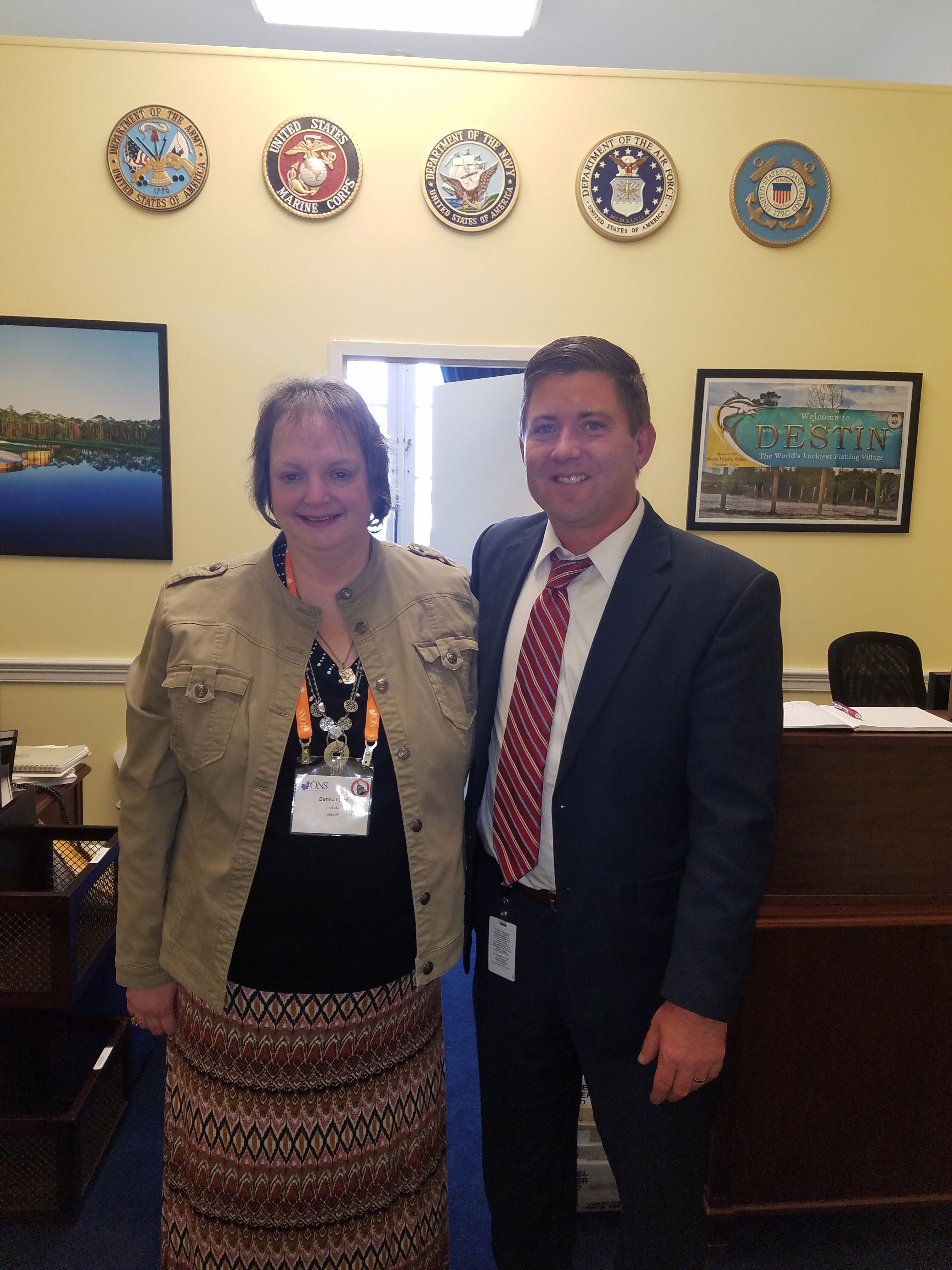Seasoned Nurse and Cancer Survivor Advocates for Quality Cancer In Our Nation
I was chosen by ONS to serve as one of its first-time oncology nurse advocates for the 2017 ONS Capitol Hill Days conference held Sept. 6-7 in Washington, DC., representing ONS and my Northwest Florida ONS Chapter.

The majority of Americans (84%) trust their nurses to be honest and ethical, according to a Gallup poll published in December 2016.
Nurses have been a mainstay on the top of the list every year, but one, since Gallup started it in 1999.
That being so, it gives oncology nurses, like myself, a lot of influence sharing our firsthand stories with legislators who help shape our governmental cancer care policies.
The Oncology Nursing Society (ONS) is a great resource for public policy initiatives. I’m grateful for my ability, even as a first-time advocate, to raise awareness for the important national legislative issues that ONS supports on behalf of oncology patients and nurses.
I was chosen by ONS to serve as one of its first-time oncology nurse advocates for the 2017 ONS Capitol Hill Days conference held Sept. 6-7 in Washington, DC., representing ONS and my Northwest Florida ONS Chapter.
I have the pleasure to wear two distinct congruent advocacy hats in my dual citizenship role as an oncology nurse and as an advanced endometrial cancer survivor.
It was an incredible experience to walk the halls of our U.S. Capitol Building to help educate elected officials and their staff on legislation that affects cancer care. I asked them to co-sponsor a few choice bills that ONS champions.
For instance, the Cancer Drug Parity Act (H.R. 1409) would provide access to affordable oral cancer medications. By removing cost barriers, patients and their providers will be able to make better decisions about care options.
The Palliative Care and Hospice Education Treatment Act (PCHETA. S. 693/H.R. 1676)—a big one—supports continued funding for end-of-life and palliative care, National Institutes of Nursing Research, National Cancer Institute, and funding for nursing education.
Leaders from my ONS chapter, along with 7 other Florida chapters, met jointly with the legislative aides for Senators Bill Nelson & Marco Rubio asking them to sign these bills.
When it was my turn to advocate solo, I was apprehensive even though I had been well-prepped by ONS. As a Christian, I’d prayed about it and knew I had God’s blessing and wisdom to help me proceed.
I was greeted warmly by my own Florida House District 1 U.S. Representative Matt Gaetz’s Chief of Staff Kip Talley.
My motivation for sitting in front of him: Losing both of my parents to cancer, surviving advanced cancer myself, and caring for patients with cancer as an oncology nurse for 20 years.
When I started my meeting with Mr. Talley, I was nervous of how he would respond . As I was sharing my personal cancer story with him, a few minutes into my talk, I felt unwanted and unwelcome tears in my eyes. I thought I’d completely blown it.
I quickly stopped, looked away, and then apologized. But when I looked up at him, he had tears in his eyes, too.
I explained that this week was my third anniversary of my own cancer diagnosis. And, since I’d been unsure I’d make it to remission, this gave me the platform to come all this way to advocate for bills important to patients with cancer.
As we talked, I sized up his knowledge about the oncology field, oncology nurses, ONS, and about the bills I was asked to come speak with him about. He knew little. So, in the 20 minutes I had with him, it was all about trying to quickly educate him on the basics, as well as share an overview of the bills we want Representative Gaetz to co-sponsor.
I shared a firsthand encounter in my own clinical work about a patient whose oral chemotherapy medication capecitabine (Xeloda) was greatly delayed because of cost. This problem could be fixed with passage of the Oral Cancer Parity Act.
In addition, I expressed that Rep. Gaetz had already recently co-sponsored 3 bills about hospice care and cancer screening, so it shouldn’t be a stretch for him to co-sponsor the bills I was speaking of.
At the close of our meeting, I ensured him that ONS would make good on his request to contact him and even offered to be a resource for him, as needed. As we shook hands, I thanked him for taking the time to meet with me. When I looked up, he again had tears in his eyes.
ONS Director of Government Affairs, Dede Sweeney, received his ONS connection request and we both have followed up with him.
We know that Rep. Gaetz and his staff are very busy. We have not heard back from them yet, but it may happen in the future.
Remember that advocacy is a marathon, not a sprint. Pro-tennis player Arthur Ashe once said, “Start where you are, use what you have, do what you can.”
And he’s right. One person at a time, one day at a time, and one project at a time, you can make a difference that will leave a lasting impact. Advocacy is not easy, but when there is passion nothing seems impossible.
Contact your legislators to make that difference. Be the advocate for patients with cancer who need your voice to advocate for them. Be the nurse to advocate for your fellow nurses. The world awaits your personal stories.
I know for myself, as a nurse advocate, my journey does not end here. I will continue moving forward to encourage other nurses to join me in this kind of activism.
For more information about the ONS Health Advocacy and Policy, visit here.


